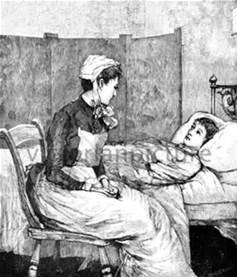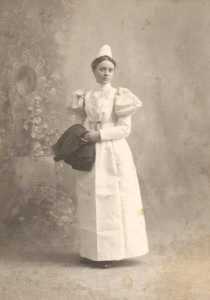Pam Lecky's Blog, page 33
October 22, 2016
A Conversation with Author W.D. Frank
T oday in the Library we have W.D. Frank, who has dropped in to say hello and to share some insights into his life as an author.
oday in the Library we have W.D. Frank, who has dropped in to say hello and to share some insights into his life as an author.
You are very welcome, please introduce yourself:
Hello! My name is W.D. Frank. I am a prisoner in a dark dimension that is accessible from somewhere in Texas. One day, I intend to break free and conquer the world. However, any outside assistance would be greatly appreciated. I also do a bit of writing to distract myself from the unimaginable suffering my captors force upon me every day. I even managed to get published! The name of my book is Lucifer’s Ladder which was published on September 25th of this year. That should bring me one step closer to global domination… somehow.
Did you read much as a child? Are you an avid reader now? Do you prefer books in your own genre or are you happy to explore others?
Most of my childhood consisted of reading. Sure, I played a lot of video-games as well, but I spent most of my time immersed in horror novels and pretty much any book I could get my hands on. I am not exaggerating either! I would occasionally find myself reading my mother’s books on explosive children and those were about me! I was a bit of a problem child. To answer your next two questions, I still read as much as I can and I am not bound to any specific genre. I will read whatever happens to catch my eye. Although, I will admit that my favourite stories tend to have a touch of darkness and tragedy in them.
Are you self-published or traditionally published?
I am traditionally published! It makes me so happy to finally be able to say that.
Which genre do you write in and why?
That’s a good question. My stories tend to fit into both the horror and fantasy genres, but I would like to say (and hopefully I don’t sound too pretentious) that they are much more than that to me. I think of them as psychological dramas with horror and fantasy elements. Each of my stories is an exploration of characters that I created. I spend all of my energy exploring who those people are through a fantastical backdrop and because I am typically exploring the minds of psychologically tortured individuals, the story naturally becomes rather scary. I love the horror and fantasy genres with a passion, but those elements in my stories are mostly used to further express my characters … if that makes any sense.
Who has been the biggest influence on your writing?
David Lynch comes to mind. He inspires the hell out of me. I would even call him my greatest idol. That being said, there are projects from other people that have influenced my writing even more than he has. My ultimate inspiration is probably the Final Fantasy series. I realize that might sound weird to someone who has only heard about my book, but if you decide to read Lucifer’s Ladder, you will see some Final Fantasy in it. I took a lot of inspiration from Japanese role playing games in general, but Final Fantasy is the series that inspired the base concept of Lucifer’s Ladder. One of my other huge inspirations is Silent Hill 2. That is such a powerful, soul-crushing game. Play it if you ever want to experience one of the most beautiful horror stories of all time. Wait! What am I doing? I am supposed to be promoting myself!
Has your country of origin/culture influenced your writing?
Nope – not as far as I can tell, however, I cannot be sure. Sometimes we are subconsciously inspired. Maybe my readers can tell me?
What part of the writing process do you find most difficult? How do you overcome it?
For me, the worst part about the writing process is convincing myself to sit still long enough to start writing. Once I manage to type a few words, the rest usually flow forth with ease.
Do you have a favourite time of day to write?
I love writing at night… or at least past midnight. I operate best in darkness.
What is the best thing about being an author? And the flipside – what is the worst?
The best thing about being an author is being loved for creating the stories that your mind is already demanding you to create. (Seriously, guys! I have no choice! These worlds and characters need to be born or I am going to explode!) For me, the worst thing about being an author is that I barely have time for anyone else.
Is social media an essential chore or something you enjoy? Which forum do you prefer?
I love the social media game. Talking with people who love me and love what I do helps me feel a lot less lonely. Plus, it is nice to know that all of my hard work is actually being appreciated. I believe that feeling alone speeds up my writing.
If you weren’t an author, what would you be up to?
Well, I would not be in the best place to say the least. Writing is pretty much a necessity for me. Although, I suppose if I had to pick another job, I would like to be an actor. At least I would still be able to vent that way.
It’s the last day and the earth is facing oblivion – what book would you read?
Probably one of my own books. Lucifer’s Ladder… most likely. I would like to reflect on what I have accomplished before I die.
Please tell us about your latest published work.
 The book I am focusing most of my attention on right now is Lucifer’s Ladder; which was released on September 25th. The story centers around a narcissistic yet undeniably brilliant high-school student named Hugh Aaron who wakes up in a post-apocalyptic wasteland. He soon learns that he has been chosen as a candidate for godhood by an entity known simply as ‘The Elder’ and that he has been tasked with liberating demonkind from the realm of torment that the current god (Yahweh) has imprisoned them in. Hugh makes it his mission to murder Yahweh and become god so that he can create an ideal world in his image. However, to accomplish that grandiose feat, Hugh must survive Yahweh’s ruthless army of angels … and the unrelenting beast of guilt that has been born from his violent and traumatic past.
The book I am focusing most of my attention on right now is Lucifer’s Ladder; which was released on September 25th. The story centers around a narcissistic yet undeniably brilliant high-school student named Hugh Aaron who wakes up in a post-apocalyptic wasteland. He soon learns that he has been chosen as a candidate for godhood by an entity known simply as ‘The Elder’ and that he has been tasked with liberating demonkind from the realm of torment that the current god (Yahweh) has imprisoned them in. Hugh makes it his mission to murder Yahweh and become god so that he can create an ideal world in his image. However, to accomplish that grandiose feat, Hugh must survive Yahweh’s ruthless army of angels … and the unrelenting beast of guilt that has been born from his violent and traumatic past.
Facebook: https://www.facebook.com/profile.php?id=100005989415462
Twitter: https://twitter.com/GregariousOtter
Website: http://frankthetank881.wixsite.com/wdfrank
Publisher’s Website: http://fearfrontpublishing.com/


October 18, 2016
TUESDAY TALK is with Irish Historical Author Pam Lecky today, discussing writers who have inspired her and some interesting dinner guests
So delighted to have been invited onto Jo’s blog today.
 JO LAMBERT - A WRITER'S JOURNEY - PEOPLE, REVIEWS AND PROMOS
JO LAMBERT - A WRITER'S JOURNEY - PEOPLE, REVIEWS AND PROMOS
Good morning Pam and welcome. Can I start, as always, by asking you a little about yourself?
Hi Jo and thank you for inviting me along for a chat. I am an Irish Indie author of historical fiction. I’m married with three children and work part-time, so my spare time is very precious. As a result, independent publishing has been wonderful as it suits my hectic life down to a tee. My debut novel, The Bowes Inheritance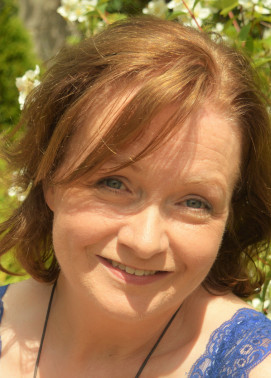 , was published in 2015. Early on, I joined the Historical Novel Society whose members, I have to say, are some of the most supportive people I have had the pleasure to meet. One of my first reviews was from the HNS and to my astonishment my book was made Editor’s Choice and longlisted for the HNS Indie Award 2016. Recently, the book has been shortlisted for The Carousel Aware Prize 2016 in…
, was published in 2015. Early on, I joined the Historical Novel Society whose members, I have to say, are some of the most supportive people I have had the pleasure to meet. One of my first reviews was from the HNS and to my astonishment my book was made Editor’s Choice and longlisted for the HNS Indie Award 2016. Recently, the book has been shortlisted for The Carousel Aware Prize 2016 in…
View original post 1,047 more words


October 12, 2016
Recipes from the Victorian Sick Room
Anyone reading Regency or Victorian novels will be all too well aware of the obsession with remedies for invalids that were handed down 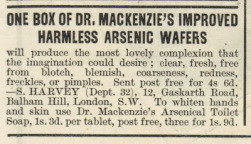 from generation to generation. Some may have worked (most were at least nutritious) and we cannot really blame them for quacking themselves when terrible diseases lurked in their homes and haunted their nightmares. With medical hindsight we can, of course, laugh at some of their ‘cures’ but huge reliance was placed on traditional recipes. Many books were written on the subject and newspapers were full of advertisements for all sorts of medicines and remedies (often lethal ones at that).
from generation to generation. Some may have worked (most were at least nutritious) and we cannot really blame them for quacking themselves when terrible diseases lurked in their homes and haunted their nightmares. With medical hindsight we can, of course, laugh at some of their ‘cures’ but huge reliance was placed on traditional recipes. Many books were written on the subject and newspapers were full of advertisements for all sorts of medicines and remedies (often lethal ones at that).
My well-thumbed edition of Beeton’s Book of Household Management is always a delight to peruse. There was no area that she feared to give advice on and there is an entire chapter on recipes for invalids. Here are a few of the more well-known ones you may have come across and always wanted to know how to make.
Arrowroot:
Arrowroot is an easily digested starch extracted from the roots of the arrowroot plant, Maranta arundinacea. It is  extremely bland, making it suitable for neutral diets, especially for people who are feeling nauseous. The Victorians considered it ideal as a food supplement as it was easily digestible. However they often flavoured it to make it more appealing.
extremely bland, making it suitable for neutral diets, especially for people who are feeling nauseous. The Victorians considered it ideal as a food supplement as it was easily digestible. However they often flavoured it to make it more appealing.
The plant is native to the tropics of South America. The roots are washed and pulped and finally forced through a sieve. The fine powder left is dried.
Ingredients:
2 teaspoons of arrowroot
3 tablespoons of cold water
Half pint of boiling water
Lump of sugar
Grated nutmeg or cinnamon
Port or sherry
Method: Mix arrowroot to a smooth paste with cold water then pour in boiling water, stirring all the time. Put thickened mixture in a tumbler, sweeten with sugar and flavour with nutmeg, cinnamon, or lemon-peel or 3 tablespoons of port or sherry.
Barley Gruel:
I t always sounded faintly disgusting to me and was made infamous by Dickens! But it actually doesn’t sound that bad (particularly if you throw in the wine!).
t always sounded faintly disgusting to me and was made infamous by Dickens! But it actually doesn’t sound that bad (particularly if you throw in the wine!).
Ingredients:
2 oz of barley
Half pint of port wine
Rind of 1 lemon
1 quart and half pint of water
Sugar to taste
Method: Wash barley; boil in half pint of water for a quarter of an hour. Pour water away. Put barley into quart of fresh boiling water and boil until the liquid is reduced to half. Strain. Add wine, sugar and lemon-peel and simmer for 5 minutes.
Beef Tea:
There are three recipes in Mrs. Beeton’s book; here is the basic one:
Ingredients:
1 lb of lean gravy-beef
1 quart of water
1 saltspoonful of salt
 Method: Dice the beef and put in a saucepan. Add cold water and bring to the boil. Skim well. Add salt and simmer gently for about three quarters of an hour, removing any scum from the surface. Strain and put in a cool place. Ideally make the day before. When wanted, remove any fat from the top and warm up, adding more salt.
Method: Dice the beef and put in a saucepan. Add cold water and bring to the boil. Skim well. Add salt and simmer gently for about three quarters of an hour, removing any scum from the surface. Strain and put in a cool place. Ideally make the day before. When wanted, remove any fat from the top and warm up, adding more salt.
Calf’s Foot Broth: (Strangely she doesn’t give a recipe for Calf’s Foot Jelly)
Ingredients:
1 calf’s foot
3 pints of water
1 small lump of sugar
Nutmeg
1 egg yolk
Nut-sized portion of butter
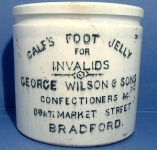 Method: Stew the foot in the water with lemon-peel until the liquid is half wasted. Skim off any fat that rises. Put aside and cool. Warm up about a half pint, adding butter, sugar and grated nutmeg. Then add beaten egg yolk stirring until mixture thickens but do not let it boil. Serve.
Method: Stew the foot in the water with lemon-peel until the liquid is half wasted. Skim off any fat that rises. Put aside and cool. Warm up about a half pint, adding butter, sugar and grated nutmeg. Then add beaten egg yolk stirring until mixture thickens but do not let it boil. Serve.
I have saved the most insipid recipe till last:
Toast-and-Water (I haven’t made this up!)
Ingredients:
Slice of bread
1 quart of boiling water
Method: Toast a slice of stale loaf to a lovely brown on both sides. Put in a jug and add the boiling water. Leave until cold. Strain and always serve cold.
Reference: Beeton’s Book of Household Management 1859


September 30, 2016
A Conversation with Author Eva Pasco
Today in the Library we have Eva Pasco, who has dropped in to say hello and to share some insights into her life as an author.
You are very welcome, Eva, please introduce yourself:
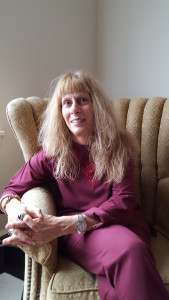 Undergoing a midlife renaissance, I rekindled my passion for storytelling by composing Contemporary Women’s Fiction that taps into significant issues affecting the lives of women over-forty. My character-driven novels host personas who plunge the depths of despair in their darkest hours prior to seeing the light at the end of the tunnel through redemption and empowerment.
Undergoing a midlife renaissance, I rekindled my passion for storytelling by composing Contemporary Women’s Fiction that taps into significant issues affecting the lives of women over-forty. My character-driven novels host personas who plunge the depths of despair in their darkest hours prior to seeing the light at the end of the tunnel through redemption and empowerment.
Did you read much as a child? Are you an avid reader now? Do you prefer books in your own genre or are you happy to explore others?
Living in a rural area as an only child until the age of 7, until my sister came along, I always had my nose in a book. While my leisure reading plummeted during my adult writing craze, it’s recently picked up at a frenetic pace through my eagerness to read and review books written by kindred Indie authors in my author support groups.
While I prefer books in my own genre of Contemporary Women’s Fiction, I’ve happily branched out to reading other genres which has broadened my horizons.
Are you self-published or traditionally published?
I’m a self-published author who used the services of an indie publisher for technical support: interior book design, implementing my custom-cover design, ISBN, copyright, print-on-demand fulfilment, sales and distribution.
Which genre do you write in and why?
I write Women’s Fiction because the genre enables me to develop realistic plots by exploring the gamut of: inner conflicts; convention vs. rebellion; fate vs. free will; loyalty vs. betrayal; love vs. sacrifice; death—inevitable or tragic?
Who has been the biggest influence on your writing?
Much credit goes to author, Anne Lamott. In the author’s own words, “I try to write the books I would love to come upon, that are honest, concerned with real lives, human hearts, spiritual transformation, families, secrets, wonders, craziness—and that can make me laugh.”
She epitomized this viewpoint in her novel, Blue Shoe, which I’d read shortly after I retired. This inspired me to revive my dormant flair for writing and follow through with my own thematic ambition to compose fiction that elevates the lives of everyday, ordinary/ extraordinary, flawed and feisty women over forty.
Has your country of origin/culture influenced your writing?
Absolutely. A lifelong native of Rhode Island, a northeastern New England state in the US, local setting is an integral part of my novels where I incorporate geographic entities, historic references, and cultural idiosyncrasies.
What part of the writing process do you find most difficult? How do you overcome it?
The glare from all that white space on a blank page at the start of a new chapter unnerves me. I overcome this hurdle by first typing in the chapter designation which may or may not be engraved in stone, depending on my decision to restructure later on. Then, I let the chips fly where they may through free-association. I type anything that enters my mind pertaining to the scene without a care in the world about sentence formation, grammar, spelling, or coherence.
Then, I step away from the mumbo jumbo and tend to a neglected household chore. Mind over matter prevails where I mentally connect the dots which enables me to arrange my random thoughts sequentially and cohesively.
Do you have a favourite time of day to write?
While I would like to write as soon as I rise and shine before daybreak, writing is relegated to afternoons. If I’m hot to trot, my session will spill into the evening. I know it’s time to stop when I begin slurring my printed words like a drunken sot.
What is the best thing about being an author? And the flipside – what is the worst?
For me, the best thing about being an author, especially an indie author, is the freedom to say and do as I please through character dialogue and action. I also have the license to kill if and when I see fit.
On the flipside, the worst aspect of being an author is the vigilance required to market and promote one’s published work to increase visibility in the public eye.
Is social media an essential chore or something you enjoy? Which forum do you prefer?
An essential chore! The lyrics to Dolly Parton’s “9 to 5” spring to mind: Tumble out of bed and I stumble to the kitchen – Pour myself a cup of ambition – Yawn and stretch and try to come to alive!
As for forum preference, I primarily navigate Facebook. The enjoyment factor seeps in through my author support groups—Marketing for Creatives, one of two, where I’m an active member. The comradery among Indie authors, along with everyone’s contributions, mutual support, and encouragement strengthen my resolve to persevere.
If you weren’t an author, what would you be up to?
Knitting! Ever the ambitious gal who can’t get away from spinning yarns, I envision myself creating cable-knit cardigans and coatigans rivaling the knitwear of Tara Irish Clothing.
It’s the last day and the earth is facing oblivion – what book would you read?
If indeed I’d be reading in the midst of a cataclysm, you’d find me misty-eyed leafing through a tattered copy of The Velveteen Rabbit by Margery Williams.
Please tell us about your latest published work.
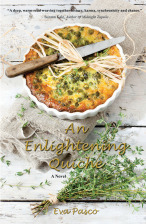 My latest published work is An Enlightening Quiche (officially released on September 20, 2016):
My latest published work is An Enlightening Quiche (officially released on September 20, 2016):
An heirloom quiche recipe and baking rivalry turn up the heat in northern Rhode Island’s French-Canadian mill town of Beauchemins, rife with secrets and scandals, fractured friendships, dysfunctional families, romantic rifts, misdeeds and mishaps.
If you would like to know more about Eva and her work please see the links below:
Amazon: myBook.to/AnEQuiche
Authors Den (where US residents can directly order a signed/personalized copy):https://www.authorsden.com/buybook.asp?bookid=70875


September 18, 2016
A Conversation with Author Kate Braithwaite
Today in the Library we have Kate Braithwaite who has dropped in to say hello and to share some insights into her life as an author.
You are very welcome, Kate, please introduce yourself:
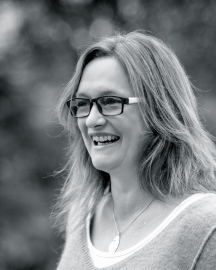 I grew up in Edinburgh but now live with my family in Pennsylvania. I write book reviews and features for Bookbrowse and the Historical Novel Society. My first novel, Charlatan, a tale of intrigue and poison in 17th century France, was published on September 15th 2016.
I grew up in Edinburgh but now live with my family in Pennsylvania. I write book reviews and features for Bookbrowse and the Historical Novel Society. My first novel, Charlatan, a tale of intrigue and poison in 17th century France, was published on September 15th 2016.
Did you read much as a child? Are you an avid reader now? Do you prefer books in your own genre or are you happy to explore others?
I read all the time growing up and I read all the time now. I first fell in love with historical novels reading Georgette Heyer as a teenager but I’ve always read a lot of literary fiction, crime novels and thrillers too. Right now I’m enjoying The Lake House by Kate Morton.
Are you self-published or traditionally published?
I’m being published by Fireship Press, a small press specializing in historical fiction.
Which genre do you write in and why?
I came across the real life story of the Affair of the Poisons at the time when I was ready to commit to writing. It was the kind of thing I’d love to read a novel all about and, as there wasn’t one, I just jumped right in. I’ve had one contemporary short story published and I’ve a middle grade novel sitting on the shelf that I might return to, but apart from that, it’s all historical. I love the research.
Who has been the biggest influence on your writing?
Years ago I read a newspaper interview with Fay Weldon where she said that most writers began as readers who “end up writing the novel they want to read, if only because nobody else has got around to writing it.” I paper-clipped that into a notebook and carried it around with me for the longest time. Another big influence is Sarah Waters. There is a brilliant twist at the end of the first part of Fingersmith. It’s so wonderfully clever. Her novel really inspired me to stop thinking about writing and actually get on and try.
Has your country of origin/culture influenced your writing?
I am Scottish and grew up in Edinburgh. Until I was six I lived in a council house directly opposite Holyrood Palace. I went to pre-school on the Royal Mile and I’m sure growing up in a city soaked in history has had its influence. Although I haven’t lived there since I was eighteen I love to go back to visit. It’s where I’m from and very important to who I am. So far, I haven’t written anything set in Scotland but there are some Scottish witch stories I’ve got my eye on!
What part of the writing process do you find most difficult? How do you overcome it?
I am not a natural editor. I can write and write but when I come big editing decisions I struggle. I’m not the kind of writer that can sit down and just go where the characters take me… and I’ve learned that the hard way! Now I know I need to outline and get my plot structure fixed first. Then I can really enjoy the writing part.
Do you have a favourite time of day to write?
I like the early morning best but when I first started trying to write on a near-to-daily basis, the only time I had was between one and three pm when my youngest took her nap. Sometimes writing in constrained circumstances helps focus the mind. Now the day looks long when the kids head out to school, but it’s amazing how the hours disappear.
What is the best thing about being an author? And the flipside – what is the worst?
It makes me immensely happy to have written a story that other people have read and enjoyed. Writing is a huge pleasure and creating a novel that a reader can believe in feels like a great personal achievement. On the flipside, it is a lonely process. It takes a lot of persistence and craft and there have definitely been times along the way when I have thought there would be a lot easier things to do in this life. Some rejections – for example when I once made massive changes to a novel for one specific agent who still rejected it – are very hard to take. My poor husband has put up with a lot!
Is social media an essential chore or something you enjoy? Which forum do you prefer?
I quite like it, although I worry about where the time goes. I enjoy facebook groups and seeing what other people are reading and writing about. There are a lot of friendly people out there! I like seeing what is trending on twitter and following lots of history related blogs and photo-based websites. There’s a lot to be inspired by.
If you weren’t an author, what would you be up to?
I used to teach people with special needs but quit work after child number three came along. I’m lucky I can spend my time writing. If not, I would probably return to something like that.
It’s the last day and the earth is facing oblivion – what book would you read?
I’m pretty sure reading, much as I love it, would be the last thing on my mind. But if I had to pick a book to read in extremis, I think I’d re-read Full Moon by PG Wodehouse. Pure escapism.
Please tell us about your latest published work.
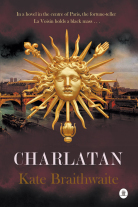 Charlatan is based on the real events of the Affair of the Poisons that rocked Paris and the court of Louis XIV. It’s the story of Athénaïs, Madame de Montespan, the King’s glamorous mistress, who is nearly forty and has had seven children with the King. But now Louis’ eyes are firmly set on a beautiful eighteen year old, newly arrived at Versailles. Her sister Gabrielle is certain Athénaïs can win him back, but she is not so sure. At the same time, in Paris, police chief La Reynie and his young assistant Bezons have uncovered a network of fortune-tellers and poisoners operating in the city. Athénaïs does not know it, but she is about to be named as a favoured client of the infamous La Voisin.
Charlatan is based on the real events of the Affair of the Poisons that rocked Paris and the court of Louis XIV. It’s the story of Athénaïs, Madame de Montespan, the King’s glamorous mistress, who is nearly forty and has had seven children with the King. But now Louis’ eyes are firmly set on a beautiful eighteen year old, newly arrived at Versailles. Her sister Gabrielle is certain Athénaïs can win him back, but she is not so sure. At the same time, in Paris, police chief La Reynie and his young assistant Bezons have uncovered a network of fortune-tellers and poisoners operating in the city. Athénaïs does not know it, but she is about to be named as a favoured client of the infamous La Voisin.
If you would like to know more about Kate and her work please click on the links below:
Website Amazon Facebook Goodreads


September 11, 2016
Dublin’s 19th Century Sweep School
 One of the most deplorable uses of child labour in 19th century Ireland was for the sweeping of chimneys. A master sweep would obtain very young boys, some as young as seven, to train as apprentices. The boys were sent up the chimney flue to brush and scrape the soot loose. The dangers were numerous – suffocation from soot, getting stuck in the flue, falling from the chimney stack or even being badly burned. A contemporary commentator on Dublin city life wrote:
One of the most deplorable uses of child labour in 19th century Ireland was for the sweeping of chimneys. A master sweep would obtain very young boys, some as young as seven, to train as apprentices. The boys were sent up the chimney flue to brush and scrape the soot loose. The dangers were numerous – suffocation from soot, getting stuck in the flue, falling from the chimney stack or even being badly burned. A contemporary commentator on Dublin city life wrote:
‘no class of the community has so much and so deservedly excited public commiseration as that of young sweeps, and we think the existence of such a trade is a reproach to the police of any state where it is permitted.’
However, it took a famous court case in Dublin to bring the subject into the public domain. It resulted in a master sweep being jailed for cruelty to his apprentice who he whipped repeatedly and burned with coals. The child was carried into court wrapped in a blanked and covered with ointment but died shortly after the trial. The sweep was sentenced to a public whipping and a huge crowd gathered to witness it.
This case led to the formation of the Society for the Protection of Young Chimney Sweeps in 1816. It emerged that many of the children were forced by their masters to engage in night-time burglaries as well. Once the children grew too big they were abandoned and left to fend for themselves.
A ‘School for Young Sweeps’ was set up in Drumcondra, Dublin, to look after these abandoned young sweeps. On Sundays, the children gathered at the school and were fed and kitted out with new shoes, shirts and caps. They were given bars of soap and a few pennies to get them through the following week. A basic education in reading, writing and arithmetic was provided as well. However, the school closed down after accusations by Catholic clergymen that the school was a front for the conversion of Catholic children to the Protestant faith.
The practice of using children to climb chimneys ended in 1864 when the Act for the Regulation of Chimney Sweepers was passed.


September 10, 2016
A Conversation with Author Jane Risdon
This evening in the Library we have Jane Risdon, who has dropped in to say hello and to share some insights into her life as an author.
You are very welcome, Jane, please introduce yourself:
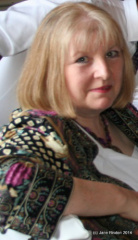 I have been writing for the last 5 years. Marrying a rock musician when still quite young, and to help support our family, I worked at the Foreign and Commonwealth Office in Whitehall where I indulged my love of mystery and intrigue. Later working in the International Music Industry managing recording artists, songwriters, record producers and actors, based mainly in Los Angeles, Singapore and Taipei, I began to garner information and experiences for my longed-for and much anticipated writing career. I read avidly and writing crime, sometimes with a touch of espionage and organised crime in the mix, reflects my love of this genre. I am published by Accent Press.
I have been writing for the last 5 years. Marrying a rock musician when still quite young, and to help support our family, I worked at the Foreign and Commonwealth Office in Whitehall where I indulged my love of mystery and intrigue. Later working in the International Music Industry managing recording artists, songwriters, record producers and actors, based mainly in Los Angeles, Singapore and Taipei, I began to garner information and experiences for my longed-for and much anticipated writing career. I read avidly and writing crime, sometimes with a touch of espionage and organised crime in the mix, reflects my love of this genre. I am published by Accent Press.
Did you read much as a child? Are you an avid reader now? Do you prefer books in your own genre or are you happy to explore others?
I always had my nose in a book as a child. It was my way of escaping a large family of so many younger siblings, who looked upon me as their other mother. When I could get time to myself, not that often, I would lose myself in Enid Blyton, Robert Louis Stevenson and similar writers.
I am an avid reader, always have been, but now time is an issue. I try to read a few chapters every night in bed. I used to read one or two books a week, but these days I seem to be able to manage only one per month. I do prefer books in my own genre. I adore reading crime/thrillers/mystery and espionage. I find I like the books written mainly for men, though not exclusively I know. I have a TBR pile to panic even the most placid of folk.
Are you self-published or traditionally published?
I have a publisher although I am also free to go elsewhere with my work if they refuse anything for whatever reason, and so it (self-publishing) might be an option I’ll explore if that happens.
I have had work published (in anthologies) in aid of various charities and they are via whichever publisher or individual has invited me to participate. I enjoy doing short stories for them.
Which genre do you write in and why?
I write mainly crime and I suppose it is because it is what interests me the most and what I read mostly. I feel comfortable in this genre and I guess I must have a criminal mind, as I seem to find it easy enough to come up with dastardly deeds for my characters.
I do dabble in other genres if the story dictates. I have written humour and have turned my hand to a couple of Ghost stories for my publisher as well as one or two romances – as in pirate stories. I am not a romantic as a person so a full blown love story isn’t my thing. But, having said that, I have co-written with a long-term friend who is a successful romance writer, and our story could be called a ‘romance,’ but not in the strictest meaning. She is still writing her parts and our publisher is waiting to set a date for publication, probably 2017 now.
Who has been the biggest influence on your writing?
Agatha Christie of course, she’s had to have influenced every Crime and Golden Age of Detection writer going. I read a lot of Mickey Spillane, Raymond Chandler, Graham Greene, John Le Carre, and Fredrick Forsyth growing up so they had a huge influence on me. I adore Daphne Du Maurier too.
Latterly I’ve read a lot of Patricia Cornwell and Michael Connolly (I adore his work) and Peter James, Peter Robinson, Nelson DeMille, Stella Rimington, Andy McNabb, Karin Slaughter, David Baldacci and Tess Gerritsen. I love so many authors in this genre it is hard to pick a favourite.
Kathy Reichs has been a huge influence and it is due to her real life role as a Forensic Anthropologist that I was minded to take some courses in Forensics, so that my writing would be accurate and up to date where modern technology is used in crime detection and the identification of the dead.
Has your country of origin/culture influenced your writing?
I am sure it has but to what extent I cannot say. I’ve spent my life living and working overseas. My family were in the army and later I married a rock musician and we travelled all over the world. Later we went into artist management and again spent our lives on the road, touring, recording and living overseas, mainly America, Singapore and Taiwan. So I imagine a lot has rubbed off.
They say write what you know, and I know the music business and, before that, life in the Foreign and Commonwealth Office in Whitehall – one end of the spectrum of experience to another. That is where my love of all things espionage comes from. My stories often have elements of espionage in them and lots of music. The music business provides great fodder for a crime writer, especially in Hollywood.
What part of the writing process do you find most difficult? How do you overcome it?
I have been typing since I was taught at school and so my handwriting has gone to pot – hand-written stories don’t happen. But I also hate sitting at the computer for hours and hours physically typing. I’d like to do a Barbara Cartland and have someone sitting at my right hand, taking my dictated stories down in short-hand and then typing them up. Fat chance though.
Do you have a favourite time of day to write?
Whenever the urge is upon me, and that is often early morning. I might end up working all day until the early hours if I am left alone. It really does depend on outside forces. I have to force myself to have a life away from the desk. Of course if I run out of tea or liquorice – a major disaster – I have to replenish supplies or nothing works.
What is the best thing about being an author? And the flipside – what is the worst?
I have been asked this before and I am not sure I have an answer. I have nearly always been my own boss, in charge, so perhaps it’s not having to answer to anyone or being responsible for others.
When I managed the careers of singers, musicians, record producers and songwriters I had a lot of responsibility for their success and making sure they were given opportunities and made the most of them. It was uphill at times because some would sit back and wait for things to happen, rather than going after something themselves. If it succeeded, it was down to them, if it failed it was down to me, so they thought. Often, once management took over, the drive and ambition seemed to take a back seat with some of them.
I guess I like being able to motivate myself. I don’t answer to anyone and I don’t have to give someone else the credit or blame when/if things do or don’t pan out. And the flipside is just that, there isn’t someone to kick my backside, critique and guide, until my work is with the editor, but by then most of the hard graft has been done, by me, alone, and without a manager like me to encourage and cajole.
Is social media an essential chore or something you enjoy? Which forum do you prefer?
I enjoy social media, it has been a great tool in the past for helping to promote my artists and I see it as essential for my work too. I love technology so this medium is wonderful for me. I can explore opportunities I’d never encounter otherwise. It can be a chore, and one can become a slave to it, but I see it as a way to reach people.
I had to work with all media – radio, television, the music press and so on in my former life, and to me social media is an extension of that work, only it’s now on my own behalf. It is the fan club newsletter, the event flyer, the word of mouth story to other like-minded folk. It is like running a band or artist, but instead of testosterone filled musicians and PMS inflamed female singers, I have little old me beavering away trying to get seen in amongst all the other cans of baked beans on the shelf.
If you weren’t an author, what would you be up to?
I’d be retired sitting back enjoying my freedom. I do enjoy the freedom from babysitting self-centred egoists I have experienced since deciding to get a life, so given the chance I would be relaxing on a yacht somewhere, with others to do my bidding for a change. Then again, I might get bored rigid and look for another artist to discover, mould and end up detesting. Nope, writing is a way of getting all those murderous thoughts and feelings out of my system and on to a page. I think I would still be writing and thus avoiding a stint in Broadmoor or similar. It’s safer I think.
It’s the last day and the earth is facing oblivion – what book would you read?
If it were the last day and I wasn’t surrounded by family and friends who’d never give me a chance to get a word in, I suppose I’d disappear into the woods or sit by a lake, and if I could concentrate I’d read Frenchman’s Creek by Daphne Du Maurier, and wait for the mushroom cloud there. I certainly wouldn’t be under the kitchen table with black sacks and tinned food as instructed in the 1980s, by the Government, in the event of a nuclear attack by Russia. We all know that’s silly.
Please tell us what you are working on at the moment.
I am working on several projects at the moment. There’s my novel Ms Birdsong Investigates: Murder at Ampney Parva, part of a series, featuring a former MI5 Officer ‘voluntarily’ retired, and living in rural Oxfordshire, following a disastrous mission with her lover and partner MI6 Officer Michael Dante. She finds herself embroiled in the search for a missing woman, the Russian Mafia and People Trafficking and Ukrainian Arms Dealers. This is going to be a series; books two and three are underway. They will be titled: Murder at the Observatory and The Safe House.
Awaiting completion by my co-author friend, Christina Jones, our novel based in the 1960s music scene, Only One Woman, is set to be published by our mutual publishers, Accent Press, early next year.
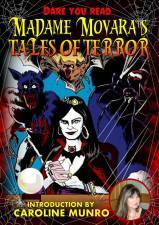 In the meantime I have a short story included in the anthology, Madame Movara’s Tales of Terror, which is on pre-order now via Amazon, and is in aid of Save the Children. It features many exciting authors and their stories, and will be in paperback in October and also on Kindle. My story is Haunting Melody and is music related. Here is the link for Madame Movara’s Tales of Terror with foreword by Hammer Horror Icon Caroline Munro. http://www.bookgoodies.com/a/B01JXDVHGK
In the meantime I have a short story included in the anthology, Madame Movara’s Tales of Terror, which is on pre-order now via Amazon, and is in aid of Save the Children. It features many exciting authors and their stories, and will be in paperback in October and also on Kindle. My story is Haunting Melody and is music related. Here is the link for Madame Movara’s Tales of Terror with foreword by Hammer Horror Icon Caroline Munro. http://www.bookgoodies.com/a/B01JXDVHGK
Pam, thanks so much for having me here and for indulging me, it’s been a blast. I do hope your readers find something to whet their appetite for my work which includes:
Wishing on a Star (Accent Press)
Shiver (Accent Press)
In A Word: Murder (Margot Kinberg Pub)
I Am Woman vol 1 (FCN Pub)
Telling Tales (Moonworks Pub)
Links to my books and publications can be found on my Amazon Author Page.
If you would like to know more about Jane and her work please click on the links below:
Amazon Author Page Blog Facebook Twitter Accent Press


August 29, 2016
The Mad Fighting Fitzgerald
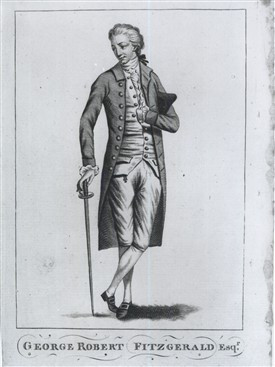 One of the most notorious characters of 18th century Dublin was George Robert Fitzgerald. Contemporaries described him as a ‘reckless duellist’, who loved to duel so much that he would provoke fights with total strangers and is reported to have fought in eleven duels by the time he reached the age of 24. He fought duels with Lord Norbury and Lord Clare and he once narrowly missed killing Denis Browne, a brother of Lord Altamont when he fired a shot at him in the middle of Sackville Street (now O’Connell Street). On one occasion George was involved in a sword duel through the streets of Castlebar, which is still the stuff of legend. It commenced at one end of Main Street, and continued all along the street ending on Ellison Street.
One of the most notorious characters of 18th century Dublin was George Robert Fitzgerald. Contemporaries described him as a ‘reckless duellist’, who loved to duel so much that he would provoke fights with total strangers and is reported to have fought in eleven duels by the time he reached the age of 24. He fought duels with Lord Norbury and Lord Clare and he once narrowly missed killing Denis Browne, a brother of Lord Altamont when he fired a shot at him in the middle of Sackville Street (now O’Connell Street). On one occasion George was involved in a sword duel through the streets of Castlebar, which is still the stuff of legend. It commenced at one end of Main Street, and continued all along the street ending on Ellison Street.
He was born in 1746, at Turlough House, Castlebar, Co. Mayo, the eldest son of George Fitzgerald and Lady Mary Hervey, daughter of Lord Hervey, Vice Chamberlain to George II. His parents separated when he was young and he went to live in England with his mother and younger brother. He attended Eton and joined the army in 1765 aged 17. At 18 he visited the French court as a protégé of the Comte d’Artois, the King’s brother, but fell out of the royal favour by fighting duels and using loaded dice at the gaming tables of Versailles.

A Typical Duel Scene of the Time
George married Jane Connolly of Castletown in Co. Kildare and was obliging enough to spend her entire dowry on an extended honeymoon of nearly three years, taking in Paris, Rome, Florence and Brussels. He returned to his house at Merrion Square Dublin alone and almost penniless.
He was constantly at loggerheads with his father over money and the Turlough estate and on one occasion he handcuffed the poor man to a dancing bear for an entire day. He was later fined and sentenced for two years in Castlebar Goal for this and for imprisoning his father in a cave on the family estate with, it was claimed, the same bear guarding the entrance!
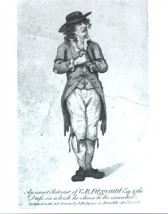
Execution at Castlebar
He was eventually tried and convicted for the murder of Randal M’Donnell, one of his neighbours, and was hanged at Castlebar on 12th June 1786, aged only thirty-nine. It was said that before his execution he drank a whole bottle of port and then threw himself off the scaffold, but the rope snapped in two and he fell to the ground. He told the sheriff to go and get another rope – but not from the same shop! But by the time a new rope was procured, he had sobered up and lost his nerve. He went to his maker crying and begging for forgiveness. His remains were removed to the family vault at Turlough where they were buried at midnight, as was the custom among the gentry at this time.


August 28, 2016
A Conversation with Author Cat Nicolaou
Today in the Library we have Cat Nicolaou, who has dropped in to say hello and to share some insights into her life as an author.
You are very welcome Cat, please introduce yourself:
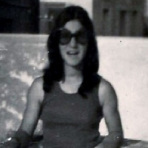 I live on a small island in Greece with my family and many pets and I am 36 years old. I have had my own business since 2000.
I live on a small island in Greece with my family and many pets and I am 36 years old. I have had my own business since 2000.
Did you read much as a child? Are you an avid reader now? Do you prefer books in your own genre or are you happy to explore others?
Although my mum has always been an avid reader and tried to make me read when I was a child, I must admit I didn’t read a lot back then. I started reading regularly when I was in my early twenties and I have never stopped since. I do love romance novels but I read all genres if a book intrigues me.
Are you self-published or traditionally published?
I am a self-published author. My debut was a romance novella “When Time Comes”, which came out in 2015, and this year I published a short story collection “Life, Love and Death”. “When Time Comes” has been translated into Spanish and Italian as well. Both books are on Amazon Select now.
Which genre do you write in and why?
I started out as a romance writer because I am an old school romantic myself, but my second book was far from being a romance. Though my books will always have a romance element, I think I will experiment with genres for a while.
Who has been the biggest influence on your writing?
My mum thinks I write like Barbara Cartland, because she used to read her books when she was young, but I consider Jane Austen to be my idol as a writer.
Has your country of origin/culture influenced your writing?
Yes, definitely! My first published book was entirely set on a Greek island and lots of my future projects will also be. Besides that, however, I do find myself attributing traits to my characters that only Greek people possess, even if my characters are not from my country. It is something I always have to look out for.
What part of the writing process do you find most difficult? How do you overcome it?
Writing itself, of course. For two reasons, first of all, I write books in English though it is not my mother tongue and that makes my writing progress very slow, because I have to think twice of what I am writing, and secondly, I tend to overload myself with work, which in turn blocks my creativity. How do I overcome my writer’s block? A stroll by the beach always helps. Looking at the sea clears my mind and I feel my creative juices flow again.
Do you have a favourite time of day to write?
I am a night owl. I cannot concentrate enough to write during daytime. Usually, I start my writing session right after midnight and I keep going till dawn.
What is the best thing about being an author? And the flipside – what is the worst?
I think the best thing about being an author is the ability to create new worlds out of nowhere; that suddenly the ‘voices’ in your head take a form and become ‘real’ people with problems like yourself and you desperately want to make them happy.
I think the worst part comes once you finish your first draft. Writers go through real agony after that. Besides the load of work we have to do in order to publish and promote our books, it can be a real drain to wait and see if people will actually like what you have produced.
Is social media an essential chore or something you enjoy? Which forum do you prefer?
I am a chatty person, so I do enjoy spending time on social media and meeting new people. I quite like twitter as a medium, though my online friends are on Facebook. Whether we like it or not, social media is a reality for all of us and I do think it’s a good way to promote yourself and your work.
If you weren’t an author, what would you be up to?
Well, I do have a day job, but let’s see… As a child, I wanted to be a singer. I do have a fairly good voice as well. Later on, I wanted to become a doctor, however. I became neither but I have a lot of respect for doctors and I think that is the thing I would like to be most, if I weren’t an author.
It’s the last day and the earth is facing oblivion – what book would you read?
I would read The Little Prince by Antoine de Saint-Exupéry because it always restores my courage.
Please tell us what you are working on.
 I am planning to publish a second book this year and right now I am working on a romance titled “Teach a Teacher a Lesson”. It is a revenge story with a twist. A young man meets his old high school teacher after ten years from graduation and wants to take revenge on her because of the emotional pain she had caused him. It is not what it looks like for neither party actually and that’s where all the fun begins. Lots of steamy scenes coming up, as well.
I am planning to publish a second book this year and right now I am working on a romance titled “Teach a Teacher a Lesson”. It is a revenge story with a twist. A young man meets his old high school teacher after ten years from graduation and wants to take revenge on her because of the emotional pain she had caused him. It is not what it looks like for neither party actually and that’s where all the fun begins. Lots of steamy scenes coming up, as well.
If you would like to know more about Cat and her work please click on the links below:
https://www.facebook.com/CatNicolaou/
https://twitter.com/catnicolaou
http://catnicolaou14.wixsite.com/cat-nicolaou


August 21, 2016
A Conversation with Author Tom Williams
Today in the Library we have Tom Williams, who has dropped in to say hello and to share some insights into his life as an author.
Tom used to write about boring things for money. If you wanted an analysis of complaints volumes in legal services or attitudes to diversity at the BBC, then he was your man. Now he writes much more interesting books about hi
storical characters and earns in a year about what he could make in a day back then. (This, unfortunately, is absolutely true.) He also writes a blog (http://thewhiterajah.blogspot.co.uk/) which is widely read all over the world and generates no income at all.
Besides making no money from writing, Tom makes no money out of occasionally teaching people to tango and then spends all the money he hasn’t made on going to dance in Argentina.
Please save Tom from himself and buy his books.
Did you read much as a child? Are you an avid reader now? Do you prefer books in your own genre or are you happy to explore others?
I was a near obsessive reader as a child. I would walk along the pavement reading, the way that people walk and text on their phones nowadays. When I was a young teenager I could read a book a day. I don’t read nearly as much now, which is probably all for the best.
I do enjoy historical novels and I like to read the odd serious work of literature, but the sad truth is that most of the time I’m reading trashy thrillers with the occasional rom-com thrown in for good measure.
Are you self-published or traditionally published?
I’m published by Accent, which is one of the new breed of independent publishers who still produce books like a traditional publishing house.
Which genre do you write in and why?
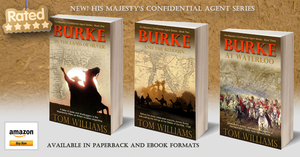 Historical fiction (Napoleonic wars and mid-19th century colonial). The first book I wrote was historical fiction and agents and publishers have told me to stick to one field – although I may branch out into something contemporary soon.
Historical fiction (Napoleonic wars and mid-19th century colonial). The first book I wrote was historical fiction and agents and publishers have told me to stick to one field – although I may branch out into something contemporary soon.
My son claims that I write historical fiction because I don’t have the imagination to make up plots for myself, and there is possibly some truth in this.
Who has been the biggest influence on your writing?
Given that I write about the Napoleonic wars, I can’t help but be influenced by Bernard Cornwell. There’s also a touch of George MacDonald Fraser, but his books are straightforwardly funny and mine aren’t.
Has your country of origin/culture influenced your writing?
I’m English and I write from an English perspective. An Italian friend asked why I don’t write about wars in Italy and I explained that I don’t understand Italian history or politics and it’s much easier to write about things I know.
Writing books set in the Napoleonic wars gives me lots of opportunity to be rude about the French. As an Englishman I take full advantage of these.
My wife’s family are Belgian and you might notice that in Burke at Waterloo I do acknowledge the extreme bravery of some of the Belgian troops who fought alongside the British. The Belgians at Waterloo are often dismissed as cowards in the same way that we played down the Prussian contribution. This started as a straightforwardly propagandistic exercise boosting British prestige in 1815, but the myth continues to this day.
What part of the writing process do you find most difficult? How do you overcome it?
Putting words on paper. The actual mechanics of writing are horrible. For anyone who hasn’t done it, imagine just copying out the whole of a novel. It’s no fun at all. Dictation software helps.
Do you have a favourite time of day to write?
In theory I start in the morning and write all day. In practice I fiddle about playing games on the computer, doing housework and doing things like answering these questions until late in the afternoon, and then I panic and write something.
What is the best thing about being an author? And the flipside – what is the worst?
The best thing is that I get to tell stories, which I’ve always wanted to do. Because I write historical novels I also spend a lot of time on research which is always interesting and can be amazing fun. For Burke in the Land of Silver I rode almost to the top of the Andes with snow on the ground. It was a stupid time of year to attempt the climb, but my hero did it in the snow and I wanted to know what it would be like. It was amazing.
The worst thing is having to sell books. I’m told that once upon a time writers wrote and then handed the books to publishers who did all the sordid commercial stuff. If this was ever true, it certainly isn’t now.
Is social media an essential chore or something you enjoy? Which forum do you prefer?
It’s an essential chore. I have a blog (http://thewhiterajah.blogspot.co.uk/) which I really enjoy writing and I would almost certainly carry on with this even if I were hugely successful and didn’t have to. I’d probably still put the odd post on my Facebook author page (https://www.facebook.com/AuthorTomWilliams/), but I’m pretty sure that I would abandon Twitter. I’m not really a fan of Twitter, although it generates a lot of interest in my blog, so I do keep doing it. And it gives me somewhere to show off photographs. Some people obviously like it and so might you, so don’t let me put you off. (@TomCW99).
If you weren’t an author, what would you be up to?
I’d be dancing tango in Buenos Aires. Or street skating in London. Or skiing in France.
It’s the last day and the earth is facing oblivion – what book would you read?
I’m all in favour of people doing a lot of reading, but I do worry that sometimes we fetishise books. If it’s the last day, you should be spending it with friends and family doing something you love together. It’s unlikely that this will be a reading group.
Please tell us what you are working on at the moment.
I am working on the next book about James Burke, which will be set in the Peninsular War. It’s on pause at the moment, though, because I’m preparing a talk on James Brooke of Sarawak, the hero of my first book, The White Rajah. I’ll be speaking at the Llandrindod Wells Victorian Festival on Friday (26 August). It would be lovely if you could come along.



